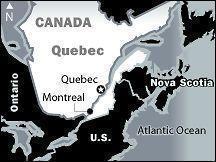 |
 |
|
|||||||
It Takes a Thief
He befriended both struggling immigrants like himself and successful, confident Muslims who had woven their way into the fabric of French-Canadian culture. Men such as Fateh Kamel, an Algerian who had married a Canadian and was a naturalized citizen. Ressam was living in squalid conditions, sharing a small apartment with other Algerians who came and went. Their squat, brown-brick building, Place de la Malicorne, had threadbare carpets, broken locks and a swimming pool of green scum.
As he had in his homeland, Ressam still liked going to discos and nightclubs. And when he did, he liked to look good, favoring Armani and other expensive European suits. But his $550-a-month welfare payments would run out after 15 months.
As they browsed among the $1,000 suits, a clerk placed a call to store detective Philippe Tete. Tete slipped into the men's department and saw two faces he had noticed before. As he watched surreptitiously, Ressam's accomplice pulled a gray Armani from an upper rack and moved it to a lower rung behind Ressam. Tete recognized the move as "the bingo," a shoplifting routine. The accomplice rolled up the jacket and slipped it under his coat, pinning it to his trunk with his left arm. In a flash, he did the same with the pants. Ressam and his friend calmly headed down the escalator toward a subway just outside Eaton's lower-level doors. As they stepped off the escalator, they looked around to see who might be watching them. At the top of the electric stairs, Tete was staring down. Ressam's friend calmly ditched the suit in a cabinet, and the two sauntered outside. Ressam reached into his La Baie shopping bag and plucked price tags from a suit. He tore up the tags and scattered them along the sidewalk. They were being tailed. Minutes later, police stopped them. In Ressam's bag, police found an Italian suit stolen from La Baie. His empty-handed friend was released. Ressam was arrested and charged, done in by a department-store detective. At his trial, Ressam tried to persuade the judge that the bag he was carrying belonged to his friend. The judge didn't buy it. He found Ressam guilty, fined him $100 and put him on probation for two years. He was ordered to leave Canada by July 23, 1995 — six weeks away. He filed an appeal to buy time. Meanwhile, Ressam, with little more to lose, continued stealing. He stalked tourists, in particular — peeking over the shoulders of Japanese women at bank machines, snatching purses, lifting unattended suitcases at hotels. He stole cash, traveler's checks, credit cards and passports.
When he wasn't "working," he drank coffee with his friends and kicked a soccer ball around a park near his apartment.
At the time, Canada had about 100,000 deportation orders, growing at a rate of 10,000 a year. Out of tens of thousands of illegal Algerians, only a few dozen each year were evicted. Ressam was safe, at least for the time being. He not only remained in his host country, he continued to hone his skill in ripping off its citizens and visitors. His reputation as a thief brought special attention from his new and prosperous friend, Fateh Kamel. Kamel, 35, was a lean, handsome man. His wife worked for a suburban school system. Kamel owned a small store, but Ressam soon learned his new friend made a living as a documents procurer for Islamic terrorists. Kamel was a true mujahedeen. He had fought in Afghanistan and Bosnia. "I am never afraid of death," Kamel would brag. "And when I want it, no one will stop me. For the jihad is the jihad, and the killing is easy for me."
Ressam was intrigued. At the very least, Kamel paid him for whatever passports, credit cards and identity documents he could steal.
Ressam successfully ripped off Montreal tourists at least 40 times, getting paid from $60 to $200 for stolen IDs. In October 1996, Ressam and a roommate were arrested for pickpocketing $300 from a guest at a downtown Holiday Inn. When he faced the sentencing judge, Ressam had a slew of strikes against him: Twice convicted as a thief. Illegal immigrant. Three months past a drop-dead deportation date. The judge fined him $500, put him on probation for two years and set him free. Ressam's family back in Bou Ismail, Algeria, knew none of this. He always was reassuring as the phone was passed from his father to his mother to his four brothers and two sisters.
"One day," he told them, "I will return."
|
|
|||||||||||||||||||||||||||||||||||||||||||||||||||||||||||||||||||||||||||||||||||||||||||||||||
|
The Terrorist Within | Reprints seattletimes.com home |


